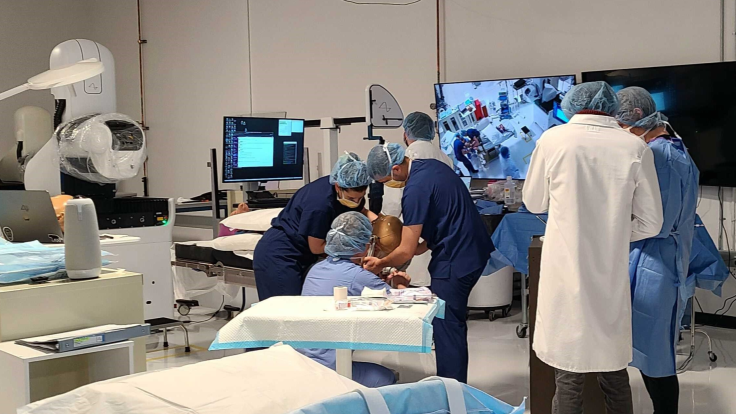Elon Musk's Neuralink Patient Moves With His Mind Hours After Surgery as 'Telepathy' Device Sparks Global Hope
Neuralink's first human implant in the UK allows a paralysed man to control a computer using his mind, marking a major leap in Elon Musk's quest to merge the brain with technology.

It took just hours after surgery for Paul, a British man left paralysed by motor neurone disease, to move a computer cursor using only his thoughts.
The historic breakthrough took place at University College London Hospitals (UCLH) and marks the United Kingdom's first successful Neuralink brain-implant procedure.
How the 'Telepathy' Chip Works
The device, called Telepathy, was developed by Elon Musk's neurotechnology company Neuralink. In a post on X, the firm said Paul's rapid recovery and immediate success with the implant highlight the transformative potential of brain-computer interface (BCI) technology to restore independence to people living with paralysis.
Neuralink's Telepathy system is a tiny brain chip linked to 64 ultra-thin threads that record and transmit brain signals to digital devices.
The threads were inserted by the company's R1 surgical robot during the operation, led by UCLH neurosurgeons Harith Akram and William Muirhead.
Once implanted, the chip captures neural activity linked to movement and converts it into digital commands. This allows users like Paul to move a cursor, type messages, or even play video games using thought alone. Neuralink said Paul is now collaborating with its engineers to expand testing, including controlling strategy games such as Dawn of War without a keyboard or mouse.
The milestone comes one year after Noland Arbaugh, Neuralink's first US participant, regained digital control through the same technology.
🇬🇧 We’re excited to announce our first participant in the UK!
— Neuralink (@neuralink) October 27, 2025
Paul, who is paralyzed due to motor neuron disease, received his Neuralink implant at @uclh earlier this month and was able to control a computer with his thoughts just hours after surgery. pic.twitter.com/Pw9g3VerJC
A UK Milestone in Global Expansion
Paul's case represents Neuralink's first successful trial outside North America, signalling the start of its global human-testing programme. The collaboration between Neuralink, UCLH and Newcastle Hospitals forms part of Musk's broader plan to expand brain-computer research across Europe.
The company has previously outlined ambitions to implant chips in up to 20,000 people annually by 2031, potentially generating more than $1 billion (£820 million) in yearly revenue. Neuralink's current valuation stands at around $9 billion (£7.4 billion) after raising over $1 billion (£820 million) in funding.
Despite its commercial growth, the company insists its core mission remains medical, helping patients with paralysis, spinal-cord injuries and neurological disorders to communicate and regain independence.
The Future and Ethics of Mind-Controlled Tech
While Neuralink's achievement has inspired hope worldwide, it has also reignited ethical and scientific debate. Experts have urged the company to release peer-reviewed studies to verify the long-term safety and accuracy of its implants. So far, Neuralink has not published formal human-trial data in scientific journals.
Competitors including Synchron, Paradromics and Blackrock Neurotech are developing similar BCIs, but Musk's firm continues to dominate headlines thanks to its speed and scale.
For Paul, however, the breakthrough is personal. The ability to move a cursor with his thoughts represents something deeper than technology, it is a step towards freedom.
As Neuralink continues its global trials, the once science-fiction dream of merging human thought with machines appears closer than ever. For now, Paul's story stands as a powerful example of how innovation can give movement, communication and hope back to the human mind.
© Copyright IBTimes 2025. All rights reserved.





















